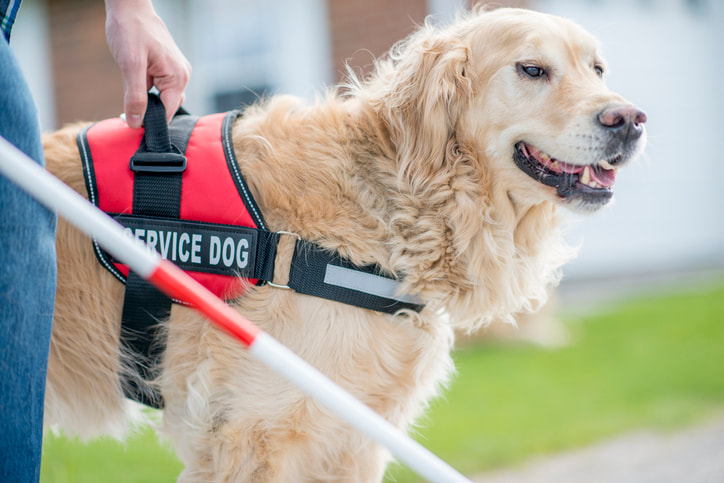Special Needs & Service Animals
The public notion on those with special needs that also have service animals is continuously evolving. Many businesses and even mobile apps like uber have become more friendly towards those that need a service animal with them at all times. The downside is that with more attention also leads to more confusion.
Let’s start at the Americans with Disabilities Act. Under the current law, it reads “any dog that is individually trained to do work or perform tasks for the benefit of an individual with a disability, including a physical, sensory, psychiatric, intellectual, or other mental disability. Other species of animals, whether wild or domestic, trained or untrained, are not service animals for the purposes of this definition.”. Many examples are animals that notify their owners if their deaf, being the seeing eyes for blind individuals or even as comfort animals in the event of anxiety attacks. Like many things related to disabilities, these animals need to be trained and certified to become service animals.
Under the Americans with Disabilities Act, any government or business (both profit and nonprofit) are required to accommodate for this, therefore allowing the use of service animals. The only times when exceptions can be made is if the animal shows to be hostile or if the addition of an animal prevents a safe operation of the business. This doesn’t apply on health codes in restaurants, so they can be allowed in as long as the dogs are leashed and tethered to the owner or someone with the owner.
If the animal does become a burden, the staff do have the right to ask about the animal; what it is and what he’s doing to accommodate a specific disability. What the staff CANNOT ask is about the person’s disability, require medical documentation, require a special identification card or training documentation for the dog, or ask that the dog demonstrate its ability to perform the work or task.
Travel with a service animal can be tough, but improvement has been made. On December 2 2020, the US Department of Transportation signed in new rules regarding airlines. First, I gave clear definition in which a service animal, “is a dog that is individually trained to do work or perform tasks for the benefit of a person with a disability and go further to require that the airlines, in most cases, allow the service animal to travel with the disabled individual”. In order to ensure that however, the animal now has a required form that shows certification, along with its health and behavior history.
What about emotional support animals? The rules have become stricter due to people whose have abused the system to bring aboard various animals regardless if they were even support animals. The airlines are under no obligation to allow a passenger to travel with an emotional support animal unless the passenger provides documentation one year old or less on letterhead of a licensed mental health professional, which states: (1) the passenger has a mental or emotional disability recognized by the DSM IV, (2) needs the emotional support animal as an accommodation for either the airline travel or an activity at the destination, (3) is under the care of the mental health professional, and (4) the professional licenses and the jurisdiction under which the license was granted.
Housing is another issue. While there are a lot of places that are welcoming to animals, many others are not, and that includes low income housing. The Fair Housing Act requires a housing provider to make a reasonable accommodation for an assistance animal where (1) a request is made by or for a person with a disability, (2) the request is supported by reliable disability-related information if the need is not readily apparent, and (3) there is no undue hardship on the housing provider such that it would impose an undue financial/administrative burden, alter the essential nature of the operations, pose a threat to health and safety of residents, or result in significant damage to the property. If someone believes that they have been denied an accommodation unreasonably they can file a complaint with HUD here.
There’s a large number of resources to turn to about service animals. This link here, which is very disabled friendly, has a wealth of information including legal rules and a network of links. Some include where and how to get an animal certified, acquiring a dog that’s already certified and even local divisions within your state.

